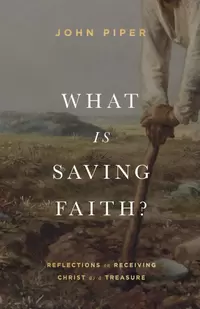John Piper
John Stephen Piper (born January 11, 1946) is an American New Testament scholar, Baptist theologian, pastor, and chancellor of Bethlehem College & Seminary in Minneapolis, Minnesota. In 1980, Piper became Pastor of Bethlehem Baptist Church in Minneapolis, Minnesota, where he ministered until March 31, 2013. Piper hit the evangelical scene after the publication of his book Desiring God: Meditations of a Christian Hedonist (1986) and has continued to publish dozens of other books further articulating this theological perspective. In 1994, he founded Desiring God Ministries, with the aim of "spread[ing] a passion for the supremacy of God in all things for the joy of all peoples through Jesus Christ." Desiring God Ministries offers all of Piper's sermons and articles from the past three decades—and most of his books—online free of charge, while also offering Piper-related media for sale, and regularly hosting conferences. Piper took an eight-month leave of absence from his ministry from May 1, 2010 to January 9, 2011. He announced in June 2011 that he would soon step down from his role of pastor. A candidate to succeed him was announced in March 2012, and on May 20, 2012 Jason Meyer was voted in (784 Yes to 8 No) to be the next Pastor for Preaching & Vision, replacing John Piper. On March 31, 2013 (Easter Sunday), Piper preached his final sermon as pastor of Bethlehem Baptist and announced in an open letter to the congregation that he and his family would be moving to Tennessee for at least a year so that the new leadership can develop a strategic vision for the church without distractions.
June 7, 2023: Baptist News Global: How to connect the dots while watching Shiny Happy People
Again, this is no different than mainstream evangelicalism. John Piper says women should not be police officers or managers at work. He also warns against women working out because it might make them appear masculine and lead to bad sex. In addition to being worshiped at Desiring God, Piper is a highly sought after featured speaker at the most influential evangelical conferences. How is he any different than Jim Bob Duggar?
Again, this is no different than mainstream evangelicalism. John Piper says women should not be police officers or managers at work. He also warns against women working out because it might make them appear masculine and lead to bad sex. In addition to being worshiped at Desiring God, Piper is a highly sought after featured speaker at the most influential evangelical conferences. How is he any different than Jim Bob Duggar?
 John Piper
John Piper
"To the emerging church that would like to minimize doctrine, Athanasius would say, 'Our young people in Alexandria die for doctrine about Christ. What do your young people die for?' Athanasius would have grieved over statements like 'It is Christ who unites us; it is doctrine that divides.' He would have grieved because he knew this is the very tactic used by Arian bishops to cover the councils with fog so that the word Christ could mean anything. They think they have done something profound and fresh, when they call us away from doctrine. In fact, they have done something very old and worn and deadly."
--John Piper. From a sermon by Mark Connelly, The Deity of Christ, 8/24/11
--John Piper. From a sermon by Mark Connelly, The Deity of Christ, 8/24/11
 John Piper
John Piper
Probably the most important thing I would say, and the most firmly rooted in Romans 1:18, is that knowing the true condition of your heart and the nature of sin and the magnitude and justice of the wrath of God will cause you to understand the mighty gospel, and love it, and cherish it, and feast on it, and share it as never before. And this is crucial because this is the way the gospel saves believers. If you don’t understand the gospel, if you don’t cherish it and look to it and feed on it day after day, it won’t save you (see 1 Corinthians 15:1–3; Colossians 1:23). Knowing sin and wrath will help you do that. --John Piper
 John Piper
John Piper
Then comes the main verb, and for the first time in this letter it's an imperative. It's a command: "Hope fully." Or: "Fix your hope completely." So the first command in this letter is an action you do with your mind and your heart. It's a command to hope. Hope is not an action of the body. It is an experience of the soul. Peter is commanding us to experience hope.
This is the main verb, the main clause, in this verse. The first two were subordinate participles: "Having girded the loins of your mind"—that's the first one; and "being sober"—that's the second one. Then comes the main predicate; "Hope fully!" Which simply means that girding up the loins of the mind and being sober are means to the end of the main thing, namely, hoping fully. -John Piper; Desiring God
This is the main verb, the main clause, in this verse. The first two were subordinate participles: "Having girded the loins of your mind"—that's the first one; and "being sober"—that's the second one. Then comes the main predicate; "Hope fully!" Which simply means that girding up the loins of the mind and being sober are means to the end of the main thing, namely, hoping fully. -John Piper; Desiring God
 John Piper
John Piper
Wrath is coming. God’s wrath — God’s anger — is coming.
Do be so sure. Paul says in Romans 1 that everyone you know, and everyone you meet, knows God at some deep level (Romans 1:21), but they have suppressed that knowledge (Romans 1:18). They even know — deep down at some suppressed level — that they break God’s law, and that wrath is coming. Romans 1:32, “Though they know God’s righteous decree that those who practice such things deserve to die, they not only do them but give approval to those who practice them.”
You may think that believing in the coming judgment and wrath of God is unintelligible to your modern friends. But think again. In fact, it is written on their hearts by God himself. They know. And they need to hear — even if they don’t admit it at first — there is a way of escape. Which Paul gets to in just a moment.
Back to verse 9: “God has not destined us for wrath.” What then? “But to obtain salvation.” Not destined for wrath, but destined for salvation. What makes this word so encouraging in the moment of crisis is the absolute certainty with which it speaks. Not: you might reach salvation. Not: You might escape wrath. Not: Maybe you are destined for that happy future. But: You are destined — you are appointed — for salvation. This decision in heaven has been made. The appointment has been set. It is firm. And it is unchangeable. --John Piper
- Jesus said in John 3:36, “Whoever believes in the Son has eternal life; whoever does not obey the Son shall not see life, but the wrath of God remains on him.”
- Paul wrote in Romans 2:5, “Because of your hard and impenitent heart you are storing up wrath for yourself on the day of wrath when God’s righteous judgment will be revealed.
- And then again in Romans 5:9, “Since, therefore, we have now been justified by his blood, much more shall we be saved by him from the wrath of God.”
Do be so sure. Paul says in Romans 1 that everyone you know, and everyone you meet, knows God at some deep level (Romans 1:21), but they have suppressed that knowledge (Romans 1:18). They even know — deep down at some suppressed level — that they break God’s law, and that wrath is coming. Romans 1:32, “Though they know God’s righteous decree that those who practice such things deserve to die, they not only do them but give approval to those who practice them.”
You may think that believing in the coming judgment and wrath of God is unintelligible to your modern friends. But think again. In fact, it is written on their hearts by God himself. They know. And they need to hear — even if they don’t admit it at first — there is a way of escape. Which Paul gets to in just a moment.
Back to verse 9: “God has not destined us for wrath.” What then? “But to obtain salvation.” Not destined for wrath, but destined for salvation. What makes this word so encouraging in the moment of crisis is the absolute certainty with which it speaks. Not: you might reach salvation. Not: You might escape wrath. Not: Maybe you are destined for that happy future. But: You are destined — you are appointed — for salvation. This decision in heaven has been made. The appointment has been set. It is firm. And it is unchangeable. --John Piper
Nov 4, 2022: Church Leaders: New Lecrae Song ‘Deconstruction’ Mentions John Piper, Voddie Baucham, Tim Keller, Tony Evans, and Judah SmithLecrae, who has been open about his faith journey in recent years, shares in his lyrics that he “still believes in the Church, but it’s gon’ take us to put in some work.”
Lecrae openly discusses his deconstruction journey, giving listeners and fans a better understanding of what he went through. The lyrics are similar to some of what he has shared in recent interviews, but with fresh vulnerability. He also mentions well-known pastors and church leaders who lent to some of his deconstruction.
Lecrae openly discusses his deconstruction journey, giving listeners and fans a better understanding of what he went through. The lyrics are similar to some of what he has shared in recent interviews, but with fresh vulnerability. He also mentions well-known pastors and church leaders who lent to some of his deconstruction.
Mar 22, 2022: The Transformed Wife: SHOULD WOMEN BE POLICE OFFICERS?
A woman asked John Piper if it was okay for women to become police officers. He answered her here. I will give a few comments from his article and then respond.
A woman asked John Piper if it was okay for women to become police officers. He answered her here. I will give a few comments from his article and then respond.
 John Piper Files
John Piper Files
“Sometimes people ask, “Why would God have bothered to create such a microscopic speck called the earth and humanity and then get involved with us?" Beneath this questions is a fundamental failure to see what the universe is about. It is about the greatness of God, not the significance of man. God made man small and the universe big to say something about Himself. And He says it is for us to learn and enjoy— namely, that He is infinitely great and powerful and wise and beautiful. The more the Hubble Telescope sends back to us about the unfathomable depths of space, the more we should stand in awe of God. The disproportion between us and the universe is a parable about the disproportion between us and God. And it is an understatement. But the point is not to nullify us but to glorify Him." — John Piper; “Don’t Waste Your Life"
Jan 2, 2023: Christian Post: John Piper: Christians who participate in body-mutilating trans surgeries are 'normalizing evil'
Theologian John Piper has explained why Christian healthcare workers should not work in hospitals that perform body-mutilating sex-change surgeries, warning that doing so contradicts “God’s revealed will,” damages people and normalizes evil in the world.
Theologian John Piper has explained why Christian healthcare workers should not work in hospitals that perform body-mutilating sex-change surgeries, warning that doing so contradicts “God’s revealed will,” damages people and normalizes evil in the world.
Sept 10, 2021: Tempo: Praying with Gary V.
Pray.com has multiple functions that can be accessed by registered users: daily prayers every morning, nightly prayers before bedtime, audio Bible stories, Christian meditations, prayer plans, podcasts of pastors from around the world including globally renowned Christian personalities like John Piper, TD Jakes, Joyce Meyer, Manny Pacquiao and even Philippine pastors James Aiton of Favor Church, Paul and Shoddy Chase, and Mylene Evangelista of New Life Church, and Bo Sanchez of Light Of Jesus Family. It also has inspirational music of different genres.
Sept 3, 2021: Relevant Magazine: Today’s Devotional: Craving God
As John Piper says, “What we hunger for most, we worship.”
Pray.com has multiple functions that can be accessed by registered users: daily prayers every morning, nightly prayers before bedtime, audio Bible stories, Christian meditations, prayer plans, podcasts of pastors from around the world including globally renowned Christian personalities like John Piper, TD Jakes, Joyce Meyer, Manny Pacquiao and even Philippine pastors James Aiton of Favor Church, Paul and Shoddy Chase, and Mylene Evangelista of New Life Church, and Bo Sanchez of Light Of Jesus Family. It also has inspirational music of different genres.
Sept 3, 2021: Relevant Magazine: Today’s Devotional: Craving God
As John Piper says, “What we hunger for most, we worship.”
2023
| Jan 28, 2023: A Prophetic Distortion of the Second Coming: 2 Thessalonians 2:1–2, Part 1 |
2022

Nov 19, 2022: Denny Burk: What Happened at the Rocky Mountain ETS?
This was the only session that I planned to listen to from start to finish, and I did. There has been some controversy around Piper’s recent book What Is Saving Faith? Reflections on Receiving Christ as a Treasure (Crossway, 2022). I won’t rehearse it all here, but some critics have charged Piper with adopting a view of faith that is more akin to Roman Catholicism than to Reformed Protestantism. Because Piper includes an affectional element in his definition of faith, he undermines sola fide. That’s the gist of the criticism anyway.
I came with an open mind and heart wanting to hear from both sides to find out who could make the most persuasive case from Scripture. John Piper presented his case first, and then Guy Waters and J. V. Fesko responded with substantial critiques. Waters focused his critique on Piper’s reading of Scripture, and Fesko focused his on Piper’s use of historical sources. Joe Rigney moderated a spirited and respectful discussion after the three papers.
This was the only session that I planned to listen to from start to finish, and I did. There has been some controversy around Piper’s recent book What Is Saving Faith? Reflections on Receiving Christ as a Treasure (Crossway, 2022). I won’t rehearse it all here, but some critics have charged Piper with adopting a view of faith that is more akin to Roman Catholicism than to Reformed Protestantism. Because Piper includes an affectional element in his definition of faith, he undermines sola fide. That’s the gist of the criticism anyway.
I came with an open mind and heart wanting to hear from both sides to find out who could make the most persuasive case from Scripture. John Piper presented his case first, and then Guy Waters and J. V. Fesko responded with substantial critiques. Waters focused his critique on Piper’s reading of Scripture, and Fesko focused his on Piper’s use of historical sources. Joe Rigney moderated a spirited and respectful discussion after the three papers.
2018
May 2, 2018: Christianity Today: Tim Keller, John Piper, and Andy Stanley Among the 12 ‘Most Effective’ Preachers
This week, Baylor University’s Truett Theological Seminary released its 2018 ranking of the ministers who set the standard for contemporary sermons. It lists a cross-denominational mix of evangelical heavyweights ranging from Reformed leaders such as John Piper and Tim Keller, to classic preachers such as Chuck Swindoll and the late Haddon Robinson, to fresher voices such as Andy Stanley and Ralph Douglas West.
This week, Baylor University’s Truett Theological Seminary released its 2018 ranking of the ministers who set the standard for contemporary sermons. It lists a cross-denominational mix of evangelical heavyweights ranging from Reformed leaders such as John Piper and Tim Keller, to classic preachers such as Chuck Swindoll and the late Haddon Robinson, to fresher voices such as Andy Stanley and Ralph Douglas West.
2016
Mar 12, 2016: Roger E Olson: John Piper Does It Again: My Response to “The Self-centeredness of Arminianism”
John Piper Does It Again: My Response to “The Self-centeredness of Arminianism”For those of you who are new to this blog or have missed reading my earlier messages here about John Piper and his many anti-Arminian messages (both in writing and in talks), let me catch you up briefly
John Piper Does It Again: My Response to “The Self-centeredness of Arminianism”For those of you who are new to this blog or have missed reading my earlier messages here about John Piper and his many anti-Arminian messages (both in writing and in talks), let me catch you up briefly
2015
Apr 28, 2015: Wartburg Watch: John Piper and Duck Dynasty: Celebrity Endorsements Validate the Demonology of Peter Wagner and Robert Morris
So, before making dinner, I decided to put the name John Piper into a search with Peter Wagner's name. My jaw hit the table. It appears that way back in 1992, approximately 6 years after the publication of Desiring God, Piper seemed to think well of the thoughts of Peter Wagner. On the Desiring God website is a sermon he preached called Angels and Prayer.
Aug 24, 2015: Wartburg 2015: John Piper Backs Himself Into a Corner and Even Reformed Complementarians Are Confused.
Over the last two years, there have been a few more people who are willing to discuss the issues surrounding John Piper.
Mar 25, 2015: Charisma: WATCH: John Piper on Why Theologians Fall Into Adultery
Why is it that people who have Ph.D.s in theology are fighting "graduate-level sins" with "grammar-school knowledge" of God? For Pastor and Theologian John Piper, it boils down to one succinct item: They don't know God.
Mar 9, 2015: Jesus Creed: John Piper and Women Preachers
Theologian John Piper was recently asked if the Bible allows women to preach as long as they do it under the permission of church elders. Piper answered, “No.”
So, before making dinner, I decided to put the name John Piper into a search with Peter Wagner's name. My jaw hit the table. It appears that way back in 1992, approximately 6 years after the publication of Desiring God, Piper seemed to think well of the thoughts of Peter Wagner. On the Desiring God website is a sermon he preached called Angels and Prayer.
Aug 24, 2015: Wartburg 2015: John Piper Backs Himself Into a Corner and Even Reformed Complementarians Are Confused.
Over the last two years, there have been a few more people who are willing to discuss the issues surrounding John Piper.
Mar 25, 2015: Charisma: WATCH: John Piper on Why Theologians Fall Into Adultery
Why is it that people who have Ph.D.s in theology are fighting "graduate-level sins" with "grammar-school knowledge" of God? For Pastor and Theologian John Piper, it boils down to one succinct item: They don't know God.
Mar 9, 2015: Jesus Creed: John Piper and Women Preachers
Theologian John Piper was recently asked if the Bible allows women to preach as long as they do it under the permission of church elders. Piper answered, “No.”
2014
Sept 18, 2014: Radical.net Blog: John Piper Interviews David Platt
Several years ago, John Piper sat down with David Platt to ask him some questions about missions and his heart for the unreached. This 30 minute video gives a great glimpse into who David is and what he’s about.
Several years ago, John Piper sat down with David Platt to ask him some questions about missions and his heart for the unreached. This 30 minute video gives a great glimpse into who David is and what he’s about.
May 18, 2014: Thoughtlife: Is Rachel Held Evans’s Use of “God Herself” Biblically Faithful?
Grounding her attacks in an oft-cited instinct for justice, Evans has—by my count—mocked and opposed the following in just the last few years: The Council on Biblical Manhood & Womanhood, The Gospel Coalition, Together for the Gospel, The Ethics & Religious Liberty Commission, Southern Seminary, Desiring God Ministries, Al Mohler, John Piper, Russell Moore, Tim Challies, Mark Driscoll, myself, Denny Burk, Andrew Walker, Doug Wilson, Jared Wilson, and the list goes on.
Grounding her attacks in an oft-cited instinct for justice, Evans has—by my count—mocked and opposed the following in just the last few years: The Council on Biblical Manhood & Womanhood, The Gospel Coalition, Together for the Gospel, The Ethics & Religious Liberty Commission, Southern Seminary, Desiring God Ministries, Al Mohler, John Piper, Russell Moore, Tim Challies, Mark Driscoll, myself, Denny Burk, Andrew Walker, Doug Wilson, Jared Wilson, and the list goes on.
Mar 5, 2014: Christian Post: John Piper Responds to Pastor David Yonggi Cho's Conviction for Embezzling $12M by Making Plea to US Pastors
When asked about the conviction of David Yonggi Cho, founder of world's largest Pentecostal congregation in South Korea, for embezzling $12 million from his church, popular pastor John Piper took the opportunity to warn pastors in the U.S. who might "love money," in a recent message.
When asked about the conviction of David Yonggi Cho, founder of world's largest Pentecostal congregation in South Korea, for embezzling $12 million from his church, popular pastor John Piper took the opportunity to warn pastors in the U.S. who might "love money," in a recent message.
Feb 22, 2014: World Magazine: Ripping racial strife out by the roots
Black History Month | We close out Black History Month with John Piper’s personal, prophetic, and profound words on the power of the gospel in racial reconciliation
Black History Month | We close out Black History Month with John Piper’s personal, prophetic, and profound words on the power of the gospel in racial reconciliation
2012
June 2012: Marlena Graves: Christianity Today: Prodigal Children: If It Can Happen to John Piper, It Can Happen to You
2010
|
Apr 5, 2010: Tim Challies: Why John Piper Should Not Have Invited Rick Warren
So John Piper has asked Rick Warren to speak at this year’s Desiring God National Conference, Think: The Life of the Mind and the Love of God. You may have heard about this, either through buzz in the blogosphere or even from Piper himself in his recent Ask Pastor John session |
Warren has proven repeatedly that he does not and will not honor the Bible. He preaches from the Bible, he knows vast amounts of Scripture and I’m sure he loves studying the Bible. But his ministry makes clear that he does not truly honor it in the way he uses it. I hardly even know where to begin here. Turn to any of Warren’s books and you will see that this is the case. Time and time again he has misused and abused the Bible. Years ago I read The Purpose Driven Life day-by-day and blogged my way through each chapter. I looked up each and every Bible reference. And in almost every chapter I found that Warren had used Scripture poorly, stretching its meaning, choosing translations that, more than being true to the text, furthered his intended meaning. This is the way he always has used Scripture and the way he continues to today. Turn to just about any review of his books and you’ll find multitudes of examples. 4.5.10 |
2009
Nov 23, 2009: H4CBlog: John Piper’s Replacement Theology
Preface: I regularly attended Bethlehem Baptist Church in Minneapolis for over eight years. The senior pastor there, Dr. John Piper, is a gifted and eloquent speaker, but I often detected a not-so-subtle theological bias in his teaching that suggested that God had no abiding interest in the State of Israel or in the Jewish people.
On June 2nd, 2009, I met with Dr. John Piper (of Bethlehem Baptist Church, Minneapolis) to discuss his theology of Israel, or “Israelology,” as it is sometimes called. I wanted to know why, in particular, Dr. Piper said (during a sermon I attended) that he “would rather have his car fixed than to get a free trip to Israel for his 30th anniversary” (i.e., as Bethlehem’s senior pastor). As a Messianic Jew, I found this comment deeply offensive coming from a man who professes to have faith in the One born “the King of the Jews” (Matt. 2:2). How could a pastor of a well-respected Evangelical church express an almost callous indifference to Israel’s past, present, or future? Is not the God Dr. Piper claims to believe in explicitly called the LORD God of Israel (Exod. 5:1, Psalm 41:13, Luke 1:68, etc.)? Did not God tell Moses that this was His Name forever (Exod. 3:15)? Is not God repeatedly called the “King of Israel” (Isa 44:6, John 12:13)? Indeed, does not the word “Messiah” itself indicate a regal title given to the anointed King of Israel? And does not the New Covenant itself (בְּרִית חֲדָשָׁה), as foretold by the prophet Jeremiah, explicitly promise the perpetuity of Israel forever (Jer. 31:31-37)?
According to the great prophet Jeremiah, if you saw the sun shine today or the stars in the night sky, you can be assured that God’s promise to preserve the “offspring of Israel” — i.e., zera Yisrael — is in effect. Indeed, in the world to come, heavenly Jerusalem will have the names of the twelve tribes of Israel engraved upon its gates (Rev. 21:12). Note well that this is the only occurrence in the entire “Old Testament” that the New Covenant (בְּרִית חֲדָשָׁה) is explicitly mentioned… It is a foundational passage of Scripture for those who claim to be followers of the Jewish Messiah…
As I discussed some of these truths with Piper, I was sure he was going to argue that God had rejected Israel because he regards the “church” as “reconstituted Israel” or else to claim that ethnic Israel had forfeited their status as God’s people because they failed to keep covenant with God (first by failing to keep the terms of Sinai, and later by rejecting Yeshua as the Messiah). Dr. Piper surprised me, however, since he claimed that the nature of the Abraham covenant, i.e., the “Covenant Between the Parts” (בְּרִית בֵּין הַבְּתָרִים) found in Genesis 15:9-21, is a conditional, rather than an unconditional covenant. This theological “move” by Dr. Piper allowed him to claim that ethnic Israel “failed” to keep the terms of that covenant (of faith) and therefore is (present tense) subject to Divine Censure or curse. In other words, the rejection of Israel in God’s plan is not on account of their failure to keep the terms of the Sinai covenant, but rather because they have failed to keep the Abrahamic covenant… This is a puzzling position, to be sure, since it negates the point the Apostle Paul made regarding the idea of “Justification by Faith” in the Book of Galatians and subtly adds an element of “works” righteousness into the idea of being declared righteous by faith alone…
At any rate, the paradox of Dr. Piper’s position — despite his commitment to Calvinism — is that it leads to a lack of assurance of salvation, since “eternal security” is based on human merit, after all. This “works righteousness” is alien to the true intent of Scripture and reveals a profound misunderstanding of the nature of the New Covenant itself (i.e., Jer. 31:31-38). It reveals a confusion between the historical covenants by regarding them as functions of fictive covenants posited by Covenant Theology itself (see below)…. If God breaks His promises to Israel, why do Christians like John Piper think that He won’t break His promises to the Church?
Ultimately I believe John Piper’s replacement theology comes from his veneration of the saints of the Reformation and to later Christian scholars who devised the theosophical paradigm called “Covenant Theology.” This system of theology, not unlike theoretical Kabbalism, claims that it understands God’s purposes and actions — even before the creation of the universe itself. The idea of “covenant” (בְּרִית), in particular, is more a philosophical construct than a genuinely Biblical doctrine, inductively discovered…. Indeed, the “great covenants” of Covenant Theology (i.e., “Works” and “Grace”) are not historically rooted interventions into the human experience made by the LORD God of Israel at all, but rather are theological fictions devised by those who claim to give a meta-narrative account for “God, the universe, and everything in it.”
Preface: I regularly attended Bethlehem Baptist Church in Minneapolis for over eight years. The senior pastor there, Dr. John Piper, is a gifted and eloquent speaker, but I often detected a not-so-subtle theological bias in his teaching that suggested that God had no abiding interest in the State of Israel or in the Jewish people.
On June 2nd, 2009, I met with Dr. John Piper (of Bethlehem Baptist Church, Minneapolis) to discuss his theology of Israel, or “Israelology,” as it is sometimes called. I wanted to know why, in particular, Dr. Piper said (during a sermon I attended) that he “would rather have his car fixed than to get a free trip to Israel for his 30th anniversary” (i.e., as Bethlehem’s senior pastor). As a Messianic Jew, I found this comment deeply offensive coming from a man who professes to have faith in the One born “the King of the Jews” (Matt. 2:2). How could a pastor of a well-respected Evangelical church express an almost callous indifference to Israel’s past, present, or future? Is not the God Dr. Piper claims to believe in explicitly called the LORD God of Israel (Exod. 5:1, Psalm 41:13, Luke 1:68, etc.)? Did not God tell Moses that this was His Name forever (Exod. 3:15)? Is not God repeatedly called the “King of Israel” (Isa 44:6, John 12:13)? Indeed, does not the word “Messiah” itself indicate a regal title given to the anointed King of Israel? And does not the New Covenant itself (בְּרִית חֲדָשָׁה), as foretold by the prophet Jeremiah, explicitly promise the perpetuity of Israel forever (Jer. 31:31-37)?
According to the great prophet Jeremiah, if you saw the sun shine today or the stars in the night sky, you can be assured that God’s promise to preserve the “offspring of Israel” — i.e., zera Yisrael — is in effect. Indeed, in the world to come, heavenly Jerusalem will have the names of the twelve tribes of Israel engraved upon its gates (Rev. 21:12). Note well that this is the only occurrence in the entire “Old Testament” that the New Covenant (בְּרִית חֲדָשָׁה) is explicitly mentioned… It is a foundational passage of Scripture for those who claim to be followers of the Jewish Messiah…
As I discussed some of these truths with Piper, I was sure he was going to argue that God had rejected Israel because he regards the “church” as “reconstituted Israel” or else to claim that ethnic Israel had forfeited their status as God’s people because they failed to keep covenant with God (first by failing to keep the terms of Sinai, and later by rejecting Yeshua as the Messiah). Dr. Piper surprised me, however, since he claimed that the nature of the Abraham covenant, i.e., the “Covenant Between the Parts” (בְּרִית בֵּין הַבְּתָרִים) found in Genesis 15:9-21, is a conditional, rather than an unconditional covenant. This theological “move” by Dr. Piper allowed him to claim that ethnic Israel “failed” to keep the terms of that covenant (of faith) and therefore is (present tense) subject to Divine Censure or curse. In other words, the rejection of Israel in God’s plan is not on account of their failure to keep the terms of the Sinai covenant, but rather because they have failed to keep the Abrahamic covenant… This is a puzzling position, to be sure, since it negates the point the Apostle Paul made regarding the idea of “Justification by Faith” in the Book of Galatians and subtly adds an element of “works” righteousness into the idea of being declared righteous by faith alone…
At any rate, the paradox of Dr. Piper’s position — despite his commitment to Calvinism — is that it leads to a lack of assurance of salvation, since “eternal security” is based on human merit, after all. This “works righteousness” is alien to the true intent of Scripture and reveals a profound misunderstanding of the nature of the New Covenant itself (i.e., Jer. 31:31-38). It reveals a confusion between the historical covenants by regarding them as functions of fictive covenants posited by Covenant Theology itself (see below)…. If God breaks His promises to Israel, why do Christians like John Piper think that He won’t break His promises to the Church?
Ultimately I believe John Piper’s replacement theology comes from his veneration of the saints of the Reformation and to later Christian scholars who devised the theosophical paradigm called “Covenant Theology.” This system of theology, not unlike theoretical Kabbalism, claims that it understands God’s purposes and actions — even before the creation of the universe itself. The idea of “covenant” (בְּרִית), in particular, is more a philosophical construct than a genuinely Biblical doctrine, inductively discovered…. Indeed, the “great covenants” of Covenant Theology (i.e., “Works” and “Grace”) are not historically rooted interventions into the human experience made by the LORD God of Israel at all, but rather are theological fictions devised by those who claim to give a meta-narrative account for “God, the universe, and everything in it.”
PRE-2008
 John Piper Files
John Piper Files
"Jesus is where we meet God. If you want to say, “Where on the planet today is a holy place that I can do a pilgrimage and be in the house of God?” Answer, “Jesus!” You want to go to a holy place on the planet? Stand still and come to Jesus. There aren’t any holy sites in the Christian religion. Zero. I’ve never gone to Israel mainly for that reason. Please, when I’m here 30 years don’t give me a free trip to Israel – fix my car! I got no problem with you going to Israel. I don’t want any emails. There’s just no more Jesus in Israel than there is in your pew right now."
-John Piper; Dec 7, 2008 Sermon
 John Piper
John Piper
To be the instrument of Jesus as he works and speaks in the world, the apostles needed a command, or commission, or an authorization that came with the authentication of the Holy Spirit. When Luke says that he gave them command through the Holy Spirit, it might mean simply that Jesus was prompted by the Holy Spirit to give the Great Commission to preach (Acts 10:42; Luke 24:47) and make disciples (Matthew 28:19). But I think Luke means for this to have relevance for the way the apostles themselves received the command, not just the way Jesus thought of it.
In John 20:21–22, there is one description of a commission that Jesus gave the apostles after his resurrection. Notice the role of the Holy Spirit here:
Jesus said to them again, “Peace be with you. As the Father has sent me, even so send I you.” [There’s the commissioning.] And when he had said this, he breathed on them, and said to them, “Receive the Holy Spirit.”
Doesn’t that sound like a situation which Luke might describe as giving commandment through the Holy Spirit? Some people say this is a kind of acted-out parable of what would happen at Pentecost when the Holy Spirit filled the apostles (Acts 2:4). But the more I think about the freedom and variety of the work of the Holy Spirit, the less I feel constrained to see this as a parabolic action. Why can we not simply say that when Jesus breathed on them and said, “Receive the Holy Spirit,” there was a real ministry of the Holy Spirit in the lives of the apostles for that moment and that situation and for the understanding and appropriation and processing of that commission?
That is what I suggest Luke means when he says that Jesus gave them a commandment through the Holy Spirit. It was through the ministry of the Holy Spirit that he spoke, and through the ministry of the Holy Spirit that they received, the word of commission. The Spirit helped them in those days before Pentecost to understand the command (Luke 24:45) and to accept the command and to be glad with the command (Luke 24:52). And this in no way contradicts that on the day of Pentecost something more happened, something deeply empowering for the fulfillment of the commission that Jesus had given them through the Holy Spirit. We will talk about that next week (Acts 1:4–5). So to be the instrument of Jesus as he works and speaks in the world, the first thing the apostles needed was a commission that came with the authentication of the Holy Spirit. That’s the point of verse 2. --John Piper; Desiring God; What Jesus Did After the Beginning 9.16.90
In John 20:21–22, there is one description of a commission that Jesus gave the apostles after his resurrection. Notice the role of the Holy Spirit here:
Jesus said to them again, “Peace be with you. As the Father has sent me, even so send I you.” [There’s the commissioning.] And when he had said this, he breathed on them, and said to them, “Receive the Holy Spirit.”
Doesn’t that sound like a situation which Luke might describe as giving commandment through the Holy Spirit? Some people say this is a kind of acted-out parable of what would happen at Pentecost when the Holy Spirit filled the apostles (Acts 2:4). But the more I think about the freedom and variety of the work of the Holy Spirit, the less I feel constrained to see this as a parabolic action. Why can we not simply say that when Jesus breathed on them and said, “Receive the Holy Spirit,” there was a real ministry of the Holy Spirit in the lives of the apostles for that moment and that situation and for the understanding and appropriation and processing of that commission?
That is what I suggest Luke means when he says that Jesus gave them a commandment through the Holy Spirit. It was through the ministry of the Holy Spirit that he spoke, and through the ministry of the Holy Spirit that they received, the word of commission. The Spirit helped them in those days before Pentecost to understand the command (Luke 24:45) and to accept the command and to be glad with the command (Luke 24:52). And this in no way contradicts that on the day of Pentecost something more happened, something deeply empowering for the fulfillment of the commission that Jesus had given them through the Holy Spirit. We will talk about that next week (Acts 1:4–5). So to be the instrument of Jesus as he works and speaks in the world, the first thing the apostles needed was a commission that came with the authentication of the Holy Spirit. That’s the point of verse 2. --John Piper; Desiring God; What Jesus Did After the Beginning 9.16.90
 John Piper
John Piper
My experience is that clear knowledge of God from the Bible is the kindling that sustains the fires of affection for God. And probably the most crucial kind of knowledge is the knowledge of what God is like in salvation. That is what the five points of Calvinism are about. Not the power and sovereignty of God in general, but his power and sovereignty in the way he saves people. That is why these points are sometimes called the doctrines of grace. To experience God fully, we need to know not just how he acts in general, but specifically how he saves us — how did he save me?
I do not begin as a Calvinist and defend a system. I begin as a Bible-believing Christian who wants to put the Bible above all systems of thought. But over the years — many years of struggle — I have deepened in my conviction that Calvinistic teachings on the five points are biblical and therefore true, and therefore a precious pathway into deeper experiences of God’s grace. --John Piper; What We Believe About the Five Points of Calvinism; May 1, 1985
I do not begin as a Calvinist and defend a system. I begin as a Bible-believing Christian who wants to put the Bible above all systems of thought. But over the years — many years of struggle — I have deepened in my conviction that Calvinistic teachings on the five points are biblical and therefore true, and therefore a precious pathway into deeper experiences of God’s grace. --John Piper; What We Believe About the Five Points of Calvinism; May 1, 1985


